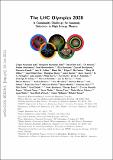The LHC Olympics 2020 a community challenge for anomaly detection in high energy physics
Author(s)
Harris, Philip
DownloadSubmitted version (8.876Mb)
Open Access Policy
Open Access Policy
Creative Commons Attribution-Noncommercial-Share Alike
Terms of use
Metadata
Show full item recordAbstract
<jats:title>Abstract</jats:title>
<jats:p>A new paradigm for data-driven, model-agnostic new physics searches at colliders is emerging, and aims to leverage recent breakthroughs in anomaly detection and machine learning. In order to develop and benchmark new anomaly detection methods within this framework, it is essential to have standard datasets. To this end, we have created the LHC Olympics 2020, a community challenge accompanied by a set of simulated collider events. Participants in these Olympics have developed their methods using an R&D dataset and then tested them on black boxes: datasets with an unknown anomaly (or not). Methods made use of modern machine learning tools and were based on unsupervised learning (autoencoders, generative adversarial networks, normalizing flows), weakly supervised learning, and semi-supervised learning. This paper will review the LHC Olympics 2020 challenge, including an overview of the competition, a description of methods deployed in the competition, lessons learned from the experience, and implications for data analyses with future datasets as well as future colliders.</jats:p>
Date issued
2021Department
Massachusetts Institute of Technology. Center for Theoretical Physics; Massachusetts Institute of Technology. Computer Science and Artificial Intelligence Laboratory; Massachusetts Institute of Technology. Laboratory for Nuclear ScienceJournal
Reports on Progress in Physics
Publisher
IOP Publishing
Citation
Harris, Philip. 2021. "The LHC Olympics 2020 a community challenge for anomaly detection in high energy physics." Reports on Progress in Physics, 84 (12).
Version: Original manuscript